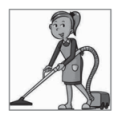200, 000 miles from Earth, the crew of the third manned mission(使命)to the Moon faced an astronaut's worst situation: an explosion on the spacecraft. It's what happened in the Oscar-winning film Apollo 13, but it's also a true story.
The lift-off of Apollo 13 took place on 11th April 1970. Two days into the mission, the three-man crew were in big trouble. They had been carrying out normal checks when there was a loud bang. Warning lights were starting to flash. Looking out into space, they could see a trail of gas—oxygen was escaping from the spacecraft. They sent out a short message to the scientists back on Earth: "Houston, we've had a problem here. " At first, they thought that a meteor(流星)had hit them, but they later found out that a short circuit(电路)had caused an oxygen container to explode. Whatever the cause, they knew there was no time to lose. Their electricity supply in the command module(指令舱)depended on that oxygen and pretty soon they would run out of both.
The only solution was to move into the lunar module—the part of the spacecraft that would have landed on the Moon. Now though, they were using it as a kind of lifeboat. With its own power supply, oxygen and water, the three men could survive in the lunar module and return to Earth. There was another problem though. In an enclosed(封闭的)space like a lunar module, the carbon dioxide(二氧化碳)the crew was breathing out was dangerous. The equipment to clear the air of carbon dioxide was only built for two people. Now it had to deal with three. Amazingly, the crew managed to build a piece of equipment out of materials onboard to reduce the carbon dioxide to a safe level.
There was one final challenge. The lunar module wasn't strong enough to re-enter Earth's atmosphere so the crew had to go back into the damaged command module. To everyone's relief, the crew of Apollo 13 arrived safely in the South Pacific Ocean on April 17th. Although the crew didn't land on the Moon, NASA still considered the mission a success.
a. A short circuit caused an explosion.
b. The crew moved to into the lunar module.
c. The crew went back into the command module.
d. The astronauts landed on the Earth successfully.
e. The astronauts sent a message to the scientists on earth.
f. The crew managed to reduce the carbon dioxide to a safe level.
A. aebfcd. B. aecdbf. C. eabcfd. D. eadbfc.


